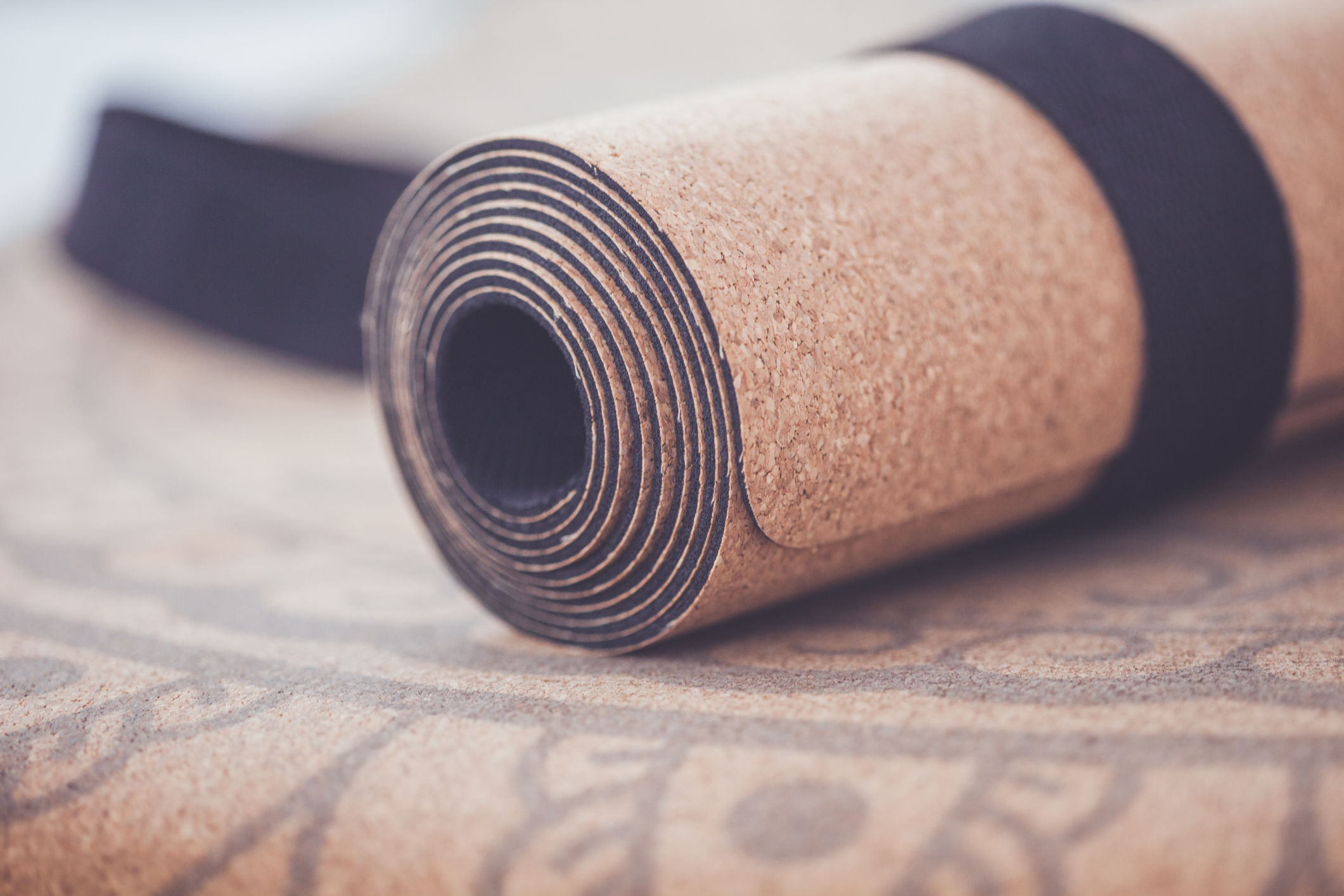
Body + Mind is reader-supported. We may earn an affiliate commission when you buy through some of the links on our site.
Natural yoga mat materials are more popular than ever. Yoga is a great way to connect with the environment around you, especially when you do it in nature. However, if you want to live more sustainably, you may not realize how your yoga mat could impact the environment.
Yoga is an exercise practice that focuses on your body’s natural inclination toward health and healing. The practice has many physical and mental health benefits, including increasing flexibility and decreasing stress levels.
Many yoga mats are partially or unsustainable, with materials such as polyvinyl chloride (PVC), which is terrible for the environment. Thankfully, there are yoga mats made of sustainable materials that you can feel good about using. Here are the top five natural yoga mat materials and some items you should consider adding to your arsenal.
Natural rubber is a plant-based polymer first documented in 1600 BC MesoAmerica.
Manufacturers still use natural rubber today, which derives from the latex in plant ducts. Natural rubber is durable and flexible like synthetic rubber, making it an excellent material for your yoga mat. It is an excellent, sustainable option that doesn’t sacrifice the strength and comfort you expect.

This non-slip and eco-friendly yoga mat is made of natural rubber and recyclable thermoplastic elastomers (TPE) to ensure a secure grip even during sweaty outdoor sessions. It has 10mm thickness, providing extra comfort and cushioning for your hands, elbows and knees. This yoga mat also features a reversible textured design so
When you think of cork, you may think of wine bottles, but cork is a great sustainable material for various products, including yoga mats. Cork forms on the outer bark of the cork oak tree, and its ease of access allowed ancient civilizations to use it for fishing and sealing wine bottles.
The material works excellently in yoga mats because it’s flexible and non-slip. It also doesn’t absorb moisture or dust, making it an excellent material for outdoor yoga.

This yoga mat is made using cork and natural tree rubber. It’s sweat-resistant, antimicrobial and 100% biodegradable, making it perfect for environmentally friendly individuals. This item provides great grip and traction, as it becomes more slip-resistant when wet.
It’s ideal for hot yoga, a type of yoga class that requires you to practice poses in a studio heated to between 80-100 degrees Fahrenheit. The extra heat makes you sweat more, and the moisture-wicking properties of cork can help you stay
Hemp is a sustainable fiber from the cannabis plant and a flexible material that’s suitable for various products, including yoga mats. It’s one of the strongest natural fibers and is resistant to mold, mildew, and UV light, making it great for various yoga scenarios.
The cannabis plant is a sustainable low-impact crop, making hemp a great choice. The material is also biodegradable, giving it a minimal environmental impact.

This lightweight yet quality mat is made with pure raw wild hemp and fine hemp cotton, which helps protect your joints during your yoga practice. The middle layer of the mat is layered with natural wool to provide extra cushioning, making it ideal for various purposes, such as outdoor sleeping or a car pillow.
Khusi organic yoga mat also comes with a long carrying strap so you can carry your yoga mat anywhere you go.
Organic cotton is a soft, sustainable yoga mat material, making it another excellent indoor yoga option. Certified organic cotton comes from plants that are sustainable even in the ground. Organic cotton plants take in carbon dioxide from the air and store it in the soil below, eliminating greenhouse gases from the air.
Once harvested, the cotton can be woven into various long-lasting biodegradable materials like yoga mats.

Using this handmade cotton mat will give you peace of mind, knowing that it doesn’t harm the environment. The cotton fabric has natural cooling properties, making your practice more comfortable. It’s created by artisans in rural areas of India, providing them with jobs and improving their social and economic status. When you buy this product, you’re helping the environment and the locals.
Jute is a grass fiber similar to hemp that creates durable and sustainable yoga mats. Its fabric is more commonly known as burlap and is very textured. While you may not consider burlap the most comfortable material, it works well in yoga mats when fashioned correctly. Jute is also long-lasting and biodegradable, making it a sustainable source for your yoga mat.

A jute yoga mat might not be your first choice when buying a mat. However, when your main priority is the planet, you’ll love the benefits of this purchase. The Gaiam yoga mat is made from all-natural jute with non-slip features that are non-latex, non-toxic and silicone-free. It’s durable and lightweight, making it ideal when you’re always on the go. The sustainable materials are also moisture-wicking, so use the mat during your hot yoga sessions.
When looking for a sustainable yoga mat, choose one that is beneficial for your practice. If you prefer restorative yoga, you’ll likely prefer a thicker, softer mat. A thinner, sturdier mat might be right if you want more stability for your poses. However, if you value sustainability without compromising comfort, you can opt for an organic mat with extra thickness.
Considering all your wants and needs will make you feel satisfied with your sustainable yoga mat purchase.
With the benefits yoga offers, it’s a worthwhile exercise for almost anyone – but you don’t want to use a yoga mat that harms the environment. Natural yoga mat materials are a great way to practice yoga sustainably and feel good about your body and daily choices.
Original Publish Date 8/18/2022 — Updated 05/28/2024
Your email address will only be used to send you our newsletter, and at any time you may unsubscribe. For more information, see our Privacy Policy.